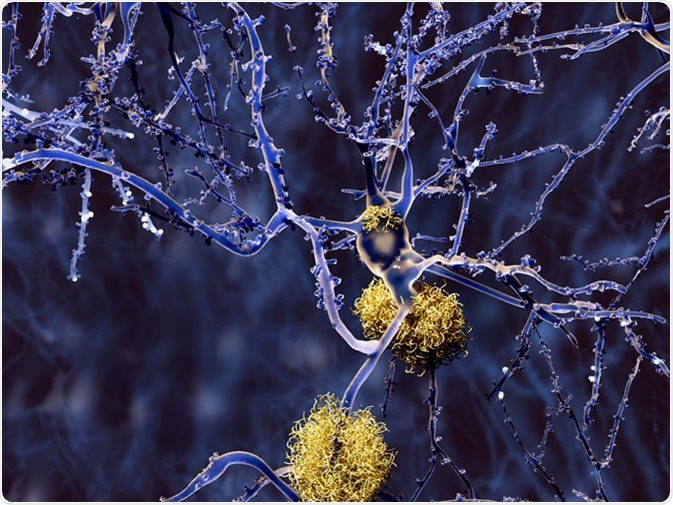Alzheimer’s disease (AD) is a chronic neurodegenerative disease characterized by loss of memory and other cognitive functions. It is the most common cause of dementia in elderly population, and is among the leading causes of death globally. Formation of amyloid plaques and tau tangles in the brain are two most common characteristic features of AD.
Several studies have revealed that a combination of genetic, environmental, and lifestyle-related factors trigger the onset and progression of AD. Studies have also suggested that vascular disorders such as high blood pressure, heart disease, and stroke, as well as metabolic abnormalities such as obesity and diabetes, are linked with the pathophysiology of AD. A healthy diet, physical activity, and social engagement have significant role in reducing the risk of AD.

Alzheimer disease: neuron with amyloid plaques. Image Credit: Juan Gaertner / Shutterstock
How Diet Impacts Alzheimer’s Disease
Diet has shown to play an important role in the pathogenesis of AD. It has been found that high consumption of animal meat is strongly associated with the risk of AD among certain populations. A higher prevalence of obesity together with elevated cholesterol, saturated fats, and iron levels is expected to be the main cause of AD in these populations.
According to Chicago Health and Aging Project; Washington Heights-Inwood and Columbia Aging Project, New York; and Cardiovascular Risk Factors, Aging, and Dementia study, Finland; consumption of saturated fatty acids, which mainly come from dairy products and meat, increases the risk of developing AD. The association between consumption of saturated fatty acids and development of cardiovascular and metabolic diseases may contribute considerably to the pathogenesis of AD.
"Is a Vegan diet helpful in the prevention of Alzheimer's?"
A link has also been established between blood cholesterol level and risk of AD. It has been found that individuals with high plasma cholesterol levels (≥240 mg/dL) in midlife are 57% more likely to develop AD later in life, compared to individuals with low plasma cholesterol levels (<200 mg/dL). High consumption of saturated fatty acids and/or high blood cholesterol level may induce the formation of amyloid plaques in the brain, indicating possible contributions of these factors towards AD.
Mediterranean diet, which is characterized by high intake of vegetables, fruits, cereals, legumes, and unsaturated fatty acids, and a low intake of meat, poultry, and saturated fatty acids, is known to reduce the risk as well as the mortality rate associated with AD. Many plant-based foods are rich in vitamins, which participate in homocysteine metabolism as cofactors. Deficiency in Vitamin B6, Vitamin B12, or folic acid is associated with elevated level of homocysteine, which, in turn, increases the risk of AD. Thus, consumption of foods, which are rich in these vitamins, is highly beneficial for reducing the risk of AD.
Considering the impact of diet on AD, several guidelines for AD prevention were established by the experts at the International Conference on Nutrition and the Brain, 2013. These guidelines included the following key points:
- Minimize the intake of saturated fats and trans fats.
- Dairy items and meat should be substituted by fruits, vegetables, legumes (peas, beans, and lentils), and whole grains as primary staple diet.
- Rely on food sources of Vitamin E instead of supplements. Healthy foods containing Vitamin E include nuts, seeds, whole grains, and leafy vegetables. The recommended dietary allowance (RDA) for Vitamin E is 15 mg daily.
- A Reliable source of Vitamin B12 such as fortified foods, or a supplement providing at least the RDA (2.4 μg per day for adults) should be a part of the daily diet.
- If using multiple vitamins, choose those without iron and copper, and consume iron supplements only when directed by the physician.
- Although aluminum's role in AD remains a matter of further investigation, those who desire to minimize their exposure can avoid the use of cookware, antacids, baking powder, or other products which contain aluminum.
- Include aerobic exercise in the routine, equivalent to 40 minutes of brisk-walk 3 times per week.
Despite several benefits in preventing AD, some studies have raised a question - ‘Whether or not following a strict vegetarian/vegan diet is healthy in all respects?’ In this context, one study has found that consuming only vegetarian diet reduces cognitive abilities compared to consuming diet that includes fish. Studies have also suggested that individuals who adhere to a strict vegetarian diet often suffer from Vitamin B12 deficiency; thus, are at high risk for developing hyperhomocysteinemia and AD.
Another disadvantage of vegetarian/vegan diet is that such diet lacks omega-3 fatty acids, including alpha linoleic acid, eicosapentaenoic acid, and docosahexaenoic acid, which are highly important for cognitive development. Supplementing the diet with omega-3 fatty acids, which mainly come from seafood and fish, has shown to reduce the risk of cardiovascular diseases and dementia, including AD.
Further Reading
Last Updated: Aug 23, 2018